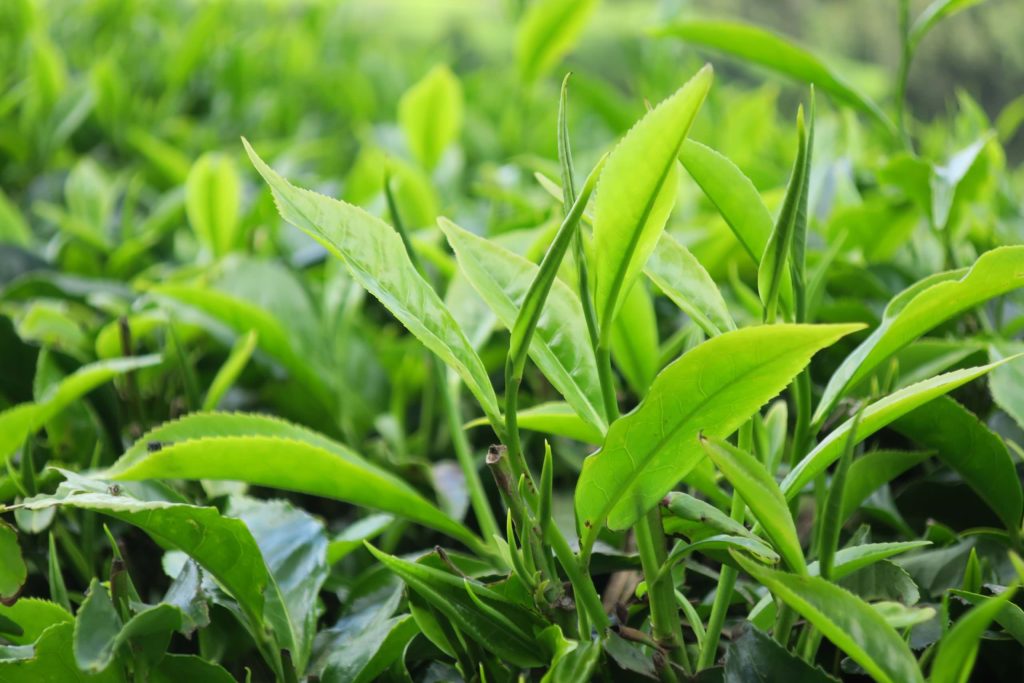Shared Responsibility: What It Means for the Tea Sector
24 min read
At the Rainforest Alliance, we have worked for years to increase yields and incomes, improve social practices, and embed environmental sustainability requirements in our certification programs. Yet, a gap remains between the status of certified farms and what we consider truly sustainable production, partly caused by the lack of resources available to producers.
We believe that creating truly sustainable global supply chains requires a shared responsibility approach. This means that the costs and benefits of certification are evenly distributed between farmers and buyers along the supply chain, so that both are rewarded for their efforts to embrace more sustainable practices.
To achieve this, we are implementing two supply chain requirements for companies as part of our Certification Program: the Sustainability Differential and Sustainability Investments. With these requirements, we are encouraging companies to acknowledge the value of sustainability and invest in and reward more sustainable production.
The Sustainability Differential (SD) is a mandatory additional cash payment made to certified producers over and above the market price of the commodity. Sustainability Investments (SI) are mandatory cash or in-kind investments from buyers of Rainforest Alliance Certified products to certified producers for the specific purpose of helping them meet the Farm Requirements of the Sustainable Agriculture Standard.
Shared responsibility in the tea sector: An incremental, brand-led approach to transforming tea supply chains
For our Shared Responsibility requirements to be effective, they need to be adapted to meet the needs and operating realities of each of our sectors. In the tea sector specifically, we support over 500 tea farms made up of nearly one million farmers and 800,000 workers. Together with our partners, we provide the tools and knowledge to implement good agricultural practices and secure access to mainstream markets that are essential for their long-term livelihoods. Our certification program and traceability platform help tea companies contribute to more sustainable supply chains while targeting their investments to where they are needed most, including workers’ wellbeing.
Still, the tea supply chain is complex. Tea moves through different channels from farm to consumer, including through auctions in key countries, and it comes in many presentations – green leaf, made tea in different varieties, tea extracts in powders and liquids.
Because there is no one-size-fits-all, and to ensure our tea Shared Responsibility approach addresses the needs of all the stakeholders involved, from the conceptualization of the new standard we have been in dialogue with many actors across the supply chain, including farmers, buyers, processors, manufacturers and packers, non-commercial tea sector actors, and tea brand companies – corporate, foodservice and retail.
Through these discussions we recognized that because investments and premiums are the exception and not the norm, and that there is pressure on prices, transforming tea supply chains must happen in incremental steps. It also became clear during these consultations that tea brands—particularly retail ones— have a key role to play in advancing a shared responsibility approach and stand to benefit greatly from it. Brand owners connect most strongly with consumers. Often, their investment in sustainable supply chains allows them to make claims and demonstrate their commitment to achieving specific corporate sustainability goals. The brand owner is also the market actor who benefits from displaying the Rainforest Alliance seal on pack, online, or making certified sourcing claims on company materials and websites.
Implementation of Shared Responsibility
Companies that source Rainforest Alliance Certified tea can make certified sourcing claims about their SD and SI payments on their website and company materials. In turn, consumers can connect with these claims and support sourcing practices that reflect their values. This brand-led approach also allows other supply chain actors, such as retailers, to directly contribute to farm improvements and farmer livelihoods in the shape of payments through their manufacturers and packers.
As consumers increasingly seek brands that do good for people and the environment, shared responsibility provides a mechanism for companies in certified supply chains to demonstrate their impact. Taking this into account, SD and SI payments are the responsibility of brand owners in our tea Shared Responsibility approach.
The specific requirements are set out in our Annex Chapter 3: Income and Shared Responsibility.
Find the timelines for SD and SI implementation in the tea sector on our Shared Responsibility Page.
We will closely monitor the outcomes of this approach to inform future adaptations on shared responsibility needs in the tea sector.
Traceability
Online traceability is a requirement of the Rainforest Alliance 2020 Standard to deliver greater transparency, link sustainability progress between source and market and improve visibility of risks and opportunity for sustainability improvements, claims and narratives. Farm and Supply Chain Certificate Holders (CH) conduct tea traceability on the Rainforest Alliance Certification Platform (RACP). It is also crucial to SD and SI implementation.
FAQs
Below, we seek to answer many of the tea-specific questions we have received on this topic in the past year. We aim to keep this page and Q&A updated as we evolve our approach.
For general questions about our shared responsibility approach, please refer to our explainer on shared responsibility.
For questions about what is required, and how to interpret those requirements, please refer to Annex Chapter 3: Income and Shared Responsibility.
General Questions
Why is the Shared Responsibility tea approach brand-led?
The Shared Responsibility approach for most of our sectors relies on the first buyer making payments. However, in the case of the tea supply chain, which is very fragmented globally, the sheer number, type, and variability of first buyers for tea makes a first-buyer approach too complex to implement efficiently. In most cases, the brand owner is the actor already making claims and investments and driving demand for the investments in the market. As consumers increasingly seek brands that do good for people and the environment, shared responsibility provides a mechanism for companies in certified supply chains to demonstrate their impact.
I am a brand owner. Can I pay either SD or SI i.e., choose between them?
No. All brand owners are required to commit and pay both SD and SI, for the footprint they redeem (sell) in the traceability platform.
How will the SD and SI payments benefit tea workers?
Workers are at the heart of the tea sector and improving workers’ livelihoods is a key goal of the Rainforest Alliance tea program. The Sustainability Differential and Sustainability Investments empower producers to define what investment support they need to better negotiate and advocate for themselves and their workers. The aim is to increase sustainability at the farm level, including improvements that directly benefit workers. Producers must include investments related to worker benefits in their Investment Plan and worker representatives must be consulted on the allocation of those investments.
How will the SD/SI approach benefit tea smallholders?
Smallholders will have the opportunity to increase their income through the additional Sustainability Differential payments which they will receive from group farm management, pro-rata, based on the volumes of green leaf they have delivered to the group, and based on the volumes sold as certified by the brand owners.
Payment of Shared Responsibility Commitments
I am required to commit and pay SD SI. To whom am I making the commitment on SD SI levels?
This is effectively a commitment to the farm certificate holders in your certified footprint, via the Rainforest Alliance traceability platform. The commitment is to the producers who supplied your brand, not to the Rainforest Alliance.
As a tea brand owner or packer, what is the minimum contribution for SD/SI I must make?
The Rainforest Alliance is committed to a shared responsibility approach, and to enabling transparency on investment needs of producers and on the performance of companies and producers.
In tea, the Sustainable Differential and Sustainable Investments are mechanisms designed for supply chain actors (in the case of tea, brand owners and packers) to support producers’ sustainability journeys. By facilitating companies to deliver what they deem to be an appropriate monetary value for Sustainability Differential, which is aligned to their own brand values and commitments, the Rainforest Alliance is giving shared responsibility the best opportunity to thrive. In the case of Sustainability Investments, the same applies, and we encourage brands owners and packers to base the amount of their payments to farm certificate holders based on farm investment plans for their supply chain. We therefore encourage brand owners/packers to consult with the individual producers in their footprint, so that the amounts paid to the final producers recognize the economic effort put into compliance with the Sustainable Agriculture Standard. In addition, for tea, we are seeking to motivate brand owners/packers by aggregating farm CH investment plans into country reports indicating tea investment needs by category.
Shared Responsibility may initially present a challenge as a shift from the usual way of working in the tea sector. The Rainforest Alliance will continue to provide support to all CHs and to producers to help them meet the core requirements of Rainforest Alliance 2020 Sustainable Agriculture Standard. In the case of brand owners this includes the payment of SD/SI by the redeeming CH.
Why is there no fixed or minimum amount of SD and SI payments for tea?
Paying a premium for certified tea, or making direct investments into certified tea farms, has been the exception rather than the norm in the tea sector. This means that data on premiums and investments have historically not been collected in a systematic way. This also means that producers have had no template for calculating the additional costs and investments that go into compliance with the Rainforest Alliance Certification. As a result, there is currently little data to base a fixed or minimum amount on.
That’s why, in the initial implementation, the Rainforest Alliance will not set a minimum for SD and SI payments. However, to create a level playing field and provide clarity to all Supply Chain Actors, we will propose as a starting point in our guidance, that:
- SDs are paid on the basis of no less than $10/MT for each MT of Rainforest Alliance Certified tea redeemed by the brand owner from their supply chain.
- SIs are paid on the basis of no less than $40/MT for each MT of Rainforest Alliance Certified tea redeemed by the brand owner from their supply chain. These are guidance amounts and are therefore non-binding. The Brand Owner can determine the SD and SI level themselves, with their manufacturer/packer if they require this.
In the future we may look at introducing a fixed or minimum SD or SI based on further data and insights collected during the initial implementation. Any changes to SD and SI levels such as fixed or minimum amounts will be communicated to the market well in advance to allow for the necessary contracting arrangements to be made.
Is this recommended SD/SI level global? Or does the Rainforest Alliance differentiate between origins/farm types?
Yes, the guidance amounts are global, and we do not currently provide guidance on other SD/SI levels. Please note that SD/SI will be committed and paid based on volumes sold (redeemed) as Rainforest Alliance certified. If these volumes are segregated volumes SD/SI differentiation between regions, origins or farms is not currently feasible. For IP (identity preserved) volumes, this differentiation is feasible.
I wish to negotiate the SD SI levels, with whom do I do that?
In the case of tea, we do not require this in our standard, so we leave it to the market as there are many supply chain arrangements in place. However, we encourage long-term relationships and long-term forward contracts, as these are most in line with the spirit of Shared Responsibility. If you are a packing brand sourcing tea directly, you can negotiate SD SI levels directly with the farm CHs from whom you source. If you are a non-packing (e.g., retail) brand, you can negotiate the SD SI levels with your manufacturer/packer who supplies your tea product via your contract packing agreement; they in turn can on your behalf negotiate SD SI levels with the farms in question.
Can already existing investments from brand owners, manufacturers or packers be considered as Sustainability Investments under the Shared Responsibility approach?
Some brands or manufacturers and packers already invest in farm sustainability. However, those investments are not always visible. We want to enable transparency for those that already support producers by making cash or in-kind investments and recognize them within the shared responsibility approach.
Investments already made by brand owners to their certified producers can be recognized as Sustainability Investments, provided these investments are expressed as investment needs or investments made by the farm CH, through their investment plans. The Certification Body auditor will verify the extent to which those investments fit the categories of investment as set out in the Rainforest Alliance Sustainability Investment Plan Template for tea and the extent to which the farm CHs (Certificate Holders) benefiting from those investments match the farm CHs in the brand owner’s footprint in the Rainforest Alliance traceability platform.
Will contracts for SD and SI payments be required in the tea sector?
No, our standard does not require this. Instead, the tea approach is based on commitments of SD and SI contributions by the brand owner or packer in our traceability platform and retrospective payments to the farm certificate holder for volumes redeemed (sold) as Rainforest Alliance Certified, in the previous quarter, on a quarterly basis.
What will be the mechanism to guarantee payment of the SD and SI?
The Rainforest Alliance will be able to monitor the areas of investment required by certified tea farms, to assure correct distribution and use, and to make more visible where investments are most needed.
Although the Rainforest Alliance cannot guarantee payment, it can suspend or decertify actors who are in the certification program but who do not comply with the requirements around shared responsibility. Through the certification system, we set the expectation and provide the mechanisms to demonstrate and verify through audits that payment has been made.
How will the Rainforest Alliance ensure that tax obligations on SD/SI payment are minimized, and payments reach farms in full?
No tax of any kind including value-added-tax or sales-tax will be included in these payments. Brand owners are fully responsible for complying with applicable laws and regulations, including applicable tax rules, and for payment of any applicable taxes and/or (government) charges. If a brand owner is required by law to withhold any taxes and/or (government) charges on the amounts payable to the Rainforest Alliance, such amounts shall be grossed up so that the net amount received by the Rainforest Alliance shall be equal to the amount committed, thereby ensuring Farm Certificate Holders get the complete SD/SI payment.
How should Brand Owners include SD/SI on invoices for payment to suppliers?
The Rainforest Alliance does not advise or guide brand owners on how to invoice their suppliers. As a commercial decision, this is outside of our scope as certification scheme owner, and something that the brand owner needs to agree on with their suppliers.
How should Brand Owners budget for future SD/SI payments?
The Rainforest Alliance does not advise or guide brand owners on budgeting, nor can we provide a method for calculating potential SD/SI liabilities. One way to do these calculations is to use as a basis historic quarterly consumption (sales) of Rainforest Alliance Certified tea.
Shared responsibility commitments – Actors
Should I commit to SD/SI if I am not responsible for end consumer packaging?
If the company is not required to redeem volumes in the system according to the rules and guidelines and is not the brand owner, then SD/SI is not applicable to them.
A company that is packing (or processing) tea final consumer products, and redeeming those volumes out of MTT, will get SD/SI requirements. So will a brand owner who packs, blends and manufactures the final labelled product.
If it is not clear to you whether you are a ‘redeeming’ certificate holder, please contact the Rainforest Alliance’s Customer Success team.
I am a trader or a processor. What is my role in this brand-led approach?
Intermediate supply chain actors i.e., those between farms and brands, are not required to commit and pay SD/SI in the case of tea. As outlined above, a non-packing brand owner can request their third-party manufacturer or packer to pay the SD/SI invoice on their behalf, and those may be “processors” or “traders” in this sense. However, all intermediate supply chain actors have an important role to play in that they are required to report sales and other activities in the Rainforest Alliance traceability platform per Annex Chapter 2: Traceablity requirements to move the certified volumes from one actor to the next in the correct manner; it is important that this is done, otherwise the brand owner at the end of the chain will not be able to redeem volumes, and commit and pay SD/SI correctly for the farm CHs in their footprint.
I am a foodservice/retail brand. Am I required to pay SD/SI?
No.
- The requirement to commit (set) the SD SI levels and pay the SD/SI is with the packer (private label manufacturer) who supplies you.
- The packer will be audited to verify commitment and payment of SD and SI.
- On behalf of their retail brand owner, the packer will be required to commit, confirm and pay the SD/SI contribution to the Farm Certificate Holder (via the Rainforest Alliance payment facility). They will do this when they redeem the volumes from the traceability platform.
- The requirement to pay SD/SI starts July 1, 2023, for volumes redeemed as Rainforest Alliance Certified. Retail brand owners will need to have systems in place to compensate their packers for the SD SI on tea volumes packed on their behalf.
- It is still the responsibility of the foodservice or retail brand to ensure that SD/SI is paid for the certified tea used in own-label products, which means that SD SI must be included in negotiations with your packer.
- If you would like to engage in traceability on the Rainforest Alliance platform, you as retailer need to take over your packer’s responsibility to commit and pay SD/SI as described above. You need to make this known to your packer. Your packer will issue sales transactions of the certified products to you in the traceability system. You will then take on the requirement to redeem volumes, commit SD SI levels, and pay SD SI for the volumes in your footprint via the Rainforest Alliance payment facility.
I am a packer supplying a foodservice/retail brand. Am I required to pay SD/SI?
Yes.
- For tea, the traceability will end with the packer (private label manufacturer) of the tea product. On behalf of their retail brand owner, the packer will be required to commit, confirm and pay the SD/SI contribution to the Farm Certificate Holder (via the Rainforest Alliance payment facility) and redeem the volumes from the traceability platform.
- The requirement to pay SD/SI starts July 1, 2023, for volumes sold as Rainforest Alliance Certified to your brand customer.
- The private label packer will be audited to verify commitment and payment of SD and SI.
- If a retailer wishes to engage in traceability for your private label tea, they need to make this known to you. The retailer will in that case be required to take over the SD/SI commitment, confirm and redeem volumes from the traceability platform and pay SD/SI through the Rainforest Alliance payment facility. In this case, you can issue sales transactions of the certified products in the traceability system towards them.
I am a private label packer supplying different retail brand owners. What do I need to do?
If you are redeeming/selling volumes to more than one retail brand owner, the retail brand owner may ask you for proof of payment of SD SI for the producers in their footprint. This proof of payment may also be necessary to include SD/SI payments in the contract between you and the retail brand. In cases where you sell packed product to more than one retail brand owner, our guidance is that you distinguish these sales and payments for each retailer’s specific volumes i.e. redeem volumes out of the Rainforest Alliance traceability platform for each retailer, so that there is attribution on the volumes, SD/SI levels and payments in each case.
We are a brand marketing both tea and herbal products. Will we have different SD/SI requirements for these crops, even though we use them in the same product?
In the Herbs and Spices program, first buyers are the supply chain CHs that are responsible for SD and SI payments. In the Tea program, that responsibility lies with the brand owner. If you are the first buyer and also the brand owner for both the herbal and tea ingredients, then you are required to pay SD and SI for both crops per the requirements for those crops as outlined in our Annex Chapter 3. If you source the herbal ingredients not from a farm but from a supply chain CH, then the SD/SI requirements apply only to the tea you sell.
Traceability
What is the goal of end-to-end Traceability?
The Rainforest Alliance vision is to link volumes from farm certificate holders to the final product claim. Reporting traceability increases the accuracy and credibility of certification by tracing certified products from farm to shelf.
What is MultiTrace?
MultiTrace is the Rainforest Alliance traceability platform to report purchases, sales, and activities on the Rainforest Alliance Certified products along the supply chain. Traceability for tea within MultiTrace was launched in December 2020.
How can traceability in MultiTrace support my sustainability and Rainforest Alliance certification efforts?
Traceability brings several benefits to farm and supply chain Certificate Holders:
- Users can identify areas where there are risks or opportunities in the production of their raw materials, and work with the Rainforest Alliance or other partners to develop and implement programs at origin to deliver impact and strengthen narratives to be used in their marketing.
- Certificate Holders have a single transactional system to record all purchases and sales of Rainforest Alliance Certified tea. This also facilitates high level reporting for internal management, and for external disclosure, for example against the Sustainable Development Goals (SDGs).
Who is responsible for traceability?
Traceability is now established from farm Certificate Holder up to the final brand owner of the certified product. If the final brand owner is a retailer, traceability for the retailer is optional and can end with the packer / private label manufacturer if the retailer does not participate in traceability.
Farm and Supply Chain Certificate Holders need to comply with the traceability requirements (Chapter 2) in the Rainforest Alliance 2020 Sustainable Agriculture Standard, to become or remain certified and use the Rainforest Alliance trademarks. This means certificate holders are required to report activities (sales, purchases, confirmations, conversions, blends/bulks, manufacturing, redeeming, removing) of the Rainforest Alliance Certified product in a traceability account in RACP. Consult Annex Chapter 2: Traceability for more information.
What tea products are in scope of traceability?
Green leaf, made tea, tea blends and tea sub-products (extracts, powders, ready to drink, and other multi-ingredient products) from the camellia sinensis (tea) plant.
What are the traceability levels in tea?
| Identity Preserved (IP) | A traceability option in which it is possible to identify the Rainforest Alliance Certified ingredient or product back to a single farm certificate holder. A volume that is traded as IP in MultiTrace will display the farm certificate holder information along the supply chain. |
| Mixed Identity Preserved (Mixed IP) | A certified product is from different certified sources/farms, but identity is preserved throughout the supply chain. A volume that is traded as Mixed IP in MultiTrace will display the farm certificate holder information along the supply chain. |
| Segregation | The full product content is certified, although it can come from different certified sources/farms, including other countries of origin. Supply Chain CHs that do not wish to display producer information should downgrade from IP to Segregated either in the Downgrade, Conversion, Mix (blend/bulk), or Sell Transaction screens. |
When do I report traceability?
Quarterly at the latest, as per requirements 2.2.1 and 2.2.3 of the standard. Some clients may request their suppliers to report more frequently.
How do I make sure I am compliant with my applicable traceability requirements?
We advise implementing a robust system of quarterly spot checks, verifying if a sample of incoming volumes matches with corresponding traceability documentation. This applies to all products carrying the Rainforest Alliance seal or to volumes linked to an off-pack claim.
Transactions in MultiTrace – General
How do I access my traceability account to perform traceability?
My volumes of Rainforest Alliance Certified tea are still in Marketplace. How do I report these sales onwards to my buyers?
As of July 1, 2022, you are not able to report traceability in Marketplace anymore. For these volumes you are required to maintain traceability documentation in the following ways:
- On-site traceability requirements (as stipulated in chapter 2.1): this means following procedures that ensure Rainforest Alliance Certified volumes can be distinguished from non-certified volumes.
- Paper-based traceability: this means keeping copies of all documentation of purchases and sales of the certified product.
- Online traceability requirements as stipulated chapter 2.2 do not apply.
What data do I need to report a transaction in MultiTrace?
Certificate Holders can use different data points to perform an activity in the traceability platform MultiTrace. Some of those data points that will be needed are the following:
- Volumes (e.g., either sold volume or amount used as an input of a conversion)
- Type of tea (e.g., black, green, etc.)
- Buyer names
- Reference numbers (e.g., chop/garden invoice number)
- Selling marks
- Activity dates (e.g., a sales date or date of conversion)
- Conversion rate
What are selling marks and why are they important?
A selling mark is the name under which the factory sells its tea. Buyers use selling marks in their sourcing decisions and to identify which tea is certified.
Farm Certificate Holders must add their selling marks in their traceability account. The selling marks need to correspond to the commercial documentation and are shared via a PowerBI platform with Supply Chain Actors holding a valid 2020 License. Only users that are added to an RACP account have access to the PowerBI report.
Find out more about selling marks on our Tea Selling Mark Guidance.
I am a Supply Chain Certificate Holder (trader, packer), what traceability activities do I need to report?
A supply chain actor may need to perform one or many of the following activities.:
- Sale of made tea or tea subproducts (Section 6.A)
- Blending or bulking of made tea (Section 19.B)
- Conversion of made tea to made tea subproducts, such as extracts or decaffeinated made tea (Section 8)
- Manufacturing of multi-ingredient products, such as ready to drink tea (Section 15)
- Redeeming or removing volumes (Sections 11 and 12)
More information can be found in the corresponding sections of the Traceability User Guidance Manual.
I am a farm Certificate Holder. What traceability activities do I need to report?
A farm certificate holder needs to perform the following activities:
- Create your selling marks. (Section 19.B)
- Convert your ‘green leaf’ to ‘made tea’. The default conversion rate is 22%. This can be edited by the user within reason. (Section 8)
- Declare sales of Made tea. (Section 6.A)
More information can be found in the corresponding sections of the Traceability User Guidance Manual.
How do I declare a sale or purchase of tea through an auction?
Sales that are conducted through an auction should be declared by the producer to the buyer (trader, processor or packer), not to intermediaries.
Do auction brokers need to declare sales done through an action?
No, brokers are not in scope for traceability.
My buyer is purchasing green leaf, what am I required to do in MultiTrace?
As the seller, you need to send a sale transaction of ‘green leaf’. A conversion to made tea would not be required in this instance.
I am selling volumes of certified tea, but I don’t want the producer information to be visible in my transaction. What can I do?
You can hide the producer information to your buyer by downgrading your volumes to the ‘Segregation’ traceability level. Country origin will always be displayed and cannot be hidden.
How do I simplify reporting in my traceability account?
MultiTrace allows you to enable certain features to help reduce the number of activities when reporting traceability actions. More information can be found in the corresponding sections of the Traceability User Guidance Manual:
- Aggregate stock positions in the system, so volumes with certain parameters will be combined. If you have the Commodity Setting ‘Aggregate positions’ turned on in your traceability account, all incoming volumes of a particular selling mark and variety will combine into one stock position. (Section 14.A)
- You can also use the function ‘Trusted Trade Partner’. When accounts are indicated as Trusted, all transactions reported by those “trusted partners” will be automatically confirmed. (Section 5)
- To report a high number of transactions at once, you can use the Excel Upload function available on MultiTrace. (Section 16)
Transactions in MultiTrace – Redeeming
I am a brand owner. Do I need to commit and pay SD/SI on the entire tea volume I buy or only on those volumes I “redeem” from the online traceability platform?
SD/SI must be committed and paid on the volumes that you are selling (redeeming) as Rainforest Alliance certified, not on the volumes you are buying. If you are making claims about Rainforest Alliance certified tea volumes, those will need to match the volumes you are selling (redeeming) from the traceability platform i.e., all volumes claimed as Rainforest Alliance certified are eligible for SD/SI.
What if a sale was made prior to July 1st and reported July 1st or later?
Anything redeemed from July 1, 2023 will be incorporated into the SD/SI report, the activity date is not relevant. This means that all volumes redeemed (sold) as Rainforest Alliance Certified after 1 July 2023, are liable for SD/SI.
What redeemed product types are in scope of SD/SI?
| Redeemed Product Type | SD/SI applicable? | MTT technicalities / Redeem |
| Made tea | Yes | |
| Instant Tea (liquid & powder) | Yes | SD/SI is based on commodity equivalent of made tea |
| Decaffeinated made tea | Yes | SD/SI is based on commodity equivalent of made tea |
| Multi-ingredient | No | Redeem is not an option for multi-ingredient |
We produce a product combining tea with other ingredients (i.e., a multi-ingredient product), do we need to pay SD/SI?
No, currently SD/SI is not required for multi-ingredient products. Certificate holders should be prepared to set up mechanisms for payments when this does come into force in the future.
Please note: The ‘redeemer’ at the end of the supply chain, who produces (does not receive) a multi-ingredient product has two options:
- Redeem the single tea ingredient (per 2.1.9 in Annex 2), in which case SD/SI can be committed and paid;
- Create a multi-ingredient product and report a manufacturing activity and not a a redeem activity. There is currently no option to redeem multi-ingredient products, which also means that for this second option SD/SI cannot be committed and paid.
What constitutes single-ingredient or multi-ingredient in the case of tea?
For product specific questions on this topic, please contact Customer Success.
A single-ingredient tea product is one where the main ingredient is Camellia tea, and the volume of other ingredients is very small. For example, in products where a manufactured flavor compound is added to a tea base at very low concentration: An Earl Grey tea blend, a Lemon Tea blend, a Jasmine tea blend, a decaffeinated tea etc.
In a multi-ingredient product, tea is just one ingredient in a mix of more substantive raw materials. For example: Any product where flowers, fruits or spices are added as a core ingredient to a tea base product, a Chai blend; an instant tea powder or liquid containing tea and also other substantive ingredients such as used to make a soft drink product, etc.
Where the added ingredient is water and not concentrated (for example a brewed tea) the product should be transacted as multi-ingredient and should not be transacted as a conversion towards a liquid extract.
I am not receiving volumes from my supplier. What can I do?
Certificate holders are responsible for ensuring their suppliers are reporting traceability in the platform. The Rainforest Alliance has drafted a letter that you can use to reach out to your suppliers. If you have done so, but your suppliers are not transacting the volumes to your account, please reach out to the Rainforest Alliance via your account manager or to the Customer Success team for support.
My supplier has declared too much volume in a transaction, what can I do?
- You can reject the transaction if it has not already been confirmed and highlight to your supplier what should be transacted instead.
- You can reverse the transaction if it has already been confirmed and highlight to your supplier what should be transacted instead.
- You can also remove the volume from your stock position and declare it as non-certified.
Note when you ‘redeem’ volumes: reversing a redeem activity in MultiTrace in another quarter is not possible does not create a negative line or credit in the following quarter. Once a commitment at the end of the quarter to pay SD/SI over redeemed volumes has been made, it is not possible to correct any paid amounts within the Tea supply chain afterwards.
My supplier has declared too little volume in a transaction, what can I do?
- You can reject the transaction if it has not already been confirmed.
- You can reverse the transaction if it has already been confirmed.
Note when you ‘redeem’ volumes: reversing a redeem activity in MultiTrace in another quarter is not possible does not create a negative line or credit in the following quarter. Once a commitment at the end of the quarter to pay SD/SI over redeemed volumes has been made, it is not possible to correct any paid amounts within the Tea supply chain afterwards.
When is the Rainforest Alliance royalty fee generated?
The royalty fee is charged only once in the supply chain.
From April 12th, 2023, the royalty fee is triggered by any one of the following:
- Blending (under the Mix functionality)
- Processing:
- Converting Made Tea to Decaffeinated Made Tea
- Converting Made Tea to Instant Tea Powder
- Converting Made Tea to Instant Tea Liquor
- Converting Made Tea to a Multi-Ingredient product.
- Redeeming (if the royalty has not been triggered already in the supply chain)
More information can be found here.





